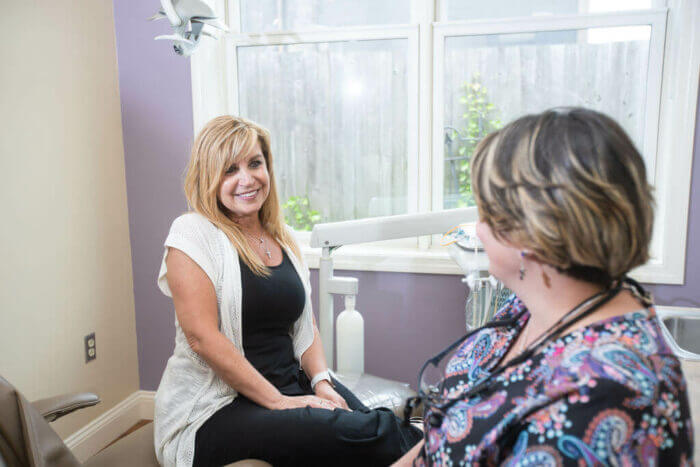
Complete Dentures
Sometimes severe tooth decay or gum disease leads to the loss of all a patient’s natural teeth. Dentures are supported and retained by closely adapting to the shapes of a patient’s jaw bones and gum tissue. Dentures are fabricated custom for everyone through a series of appointments. Tooth shape and shade (color), as well as tooth position, function and phonetics are considered. The doctors work closely with several local dental lab technicians to produce a high-quality finished product. It is important for a patient to recognize the challenges they may face with a new denture. Patients must commit to practice chewing, speaking, and smiling with their new dentures and minor adjustments are often needed over the first few weeks.
Partial Dentures
For patients missing a few or many teeth, a removable partial denture may be right for them. Traditional removable partial dentures are made from a combination of acrylic and metal. The metal frame provides strength and rigidity. Clasps and rest seats are strategically placed on the appliance to provide the best possible fit. Sometimes the natural teeth need to be modified to accommodate the appliance. Depending on the design of the appliance some of the metal clasps may be visible. Removable partial dentures must be removed after meals for cleaning and must be removed while the patient sleeps.
Metal Free Partials
Like their traditional cousin, a metal free partial denture takes advantage of newer, lightweight, flexible plastic as a substitute for the metal. These appliances rely on a snug fit to remain in place throughout the day. Metal free partials are a great cosmetic choice in many cases. A consultation with your doctor is essential to design a plan that will provide the best possible outcome for your situation.
Implant Supported Appliances
A dental implant is a titanium screw that is surgically placed in your jaw bone in an area without a tooth. With the right parts a dental implant can improve the stability and hold of a complete or partial denture. These appliances are held in place through a system of snaps, yet they are still removable by the patient for daily cleaning.
In the case of the completely edentulous (missing all teeth) patient, multiple implants can be used to create an appliance that is less bulky and more retentive. These appliances are much more effective and efficient for chewing.
If you currently have a properly fitting complete denture or partial denture but wish to improve your overall hold or chewing capacity, talk to your doctor about a conversion. In many cases your current appliance can be modified to accept new dental implants and fittings.
Repairs
If your denture or partial denture needs a repair your dentist can help. Whether from an accidental drop or normal wear and tear, a broken appliance is a headache! If you experience a problem, please call the office for an appointment. Bring your appliance and any broken parts you can recover. Your dentist will evaluate the problem and offer solutions for resolution. Repairs are carried out by local, trained laboratory technicians. Most repairs require at least 24 hours to complete.
